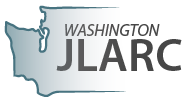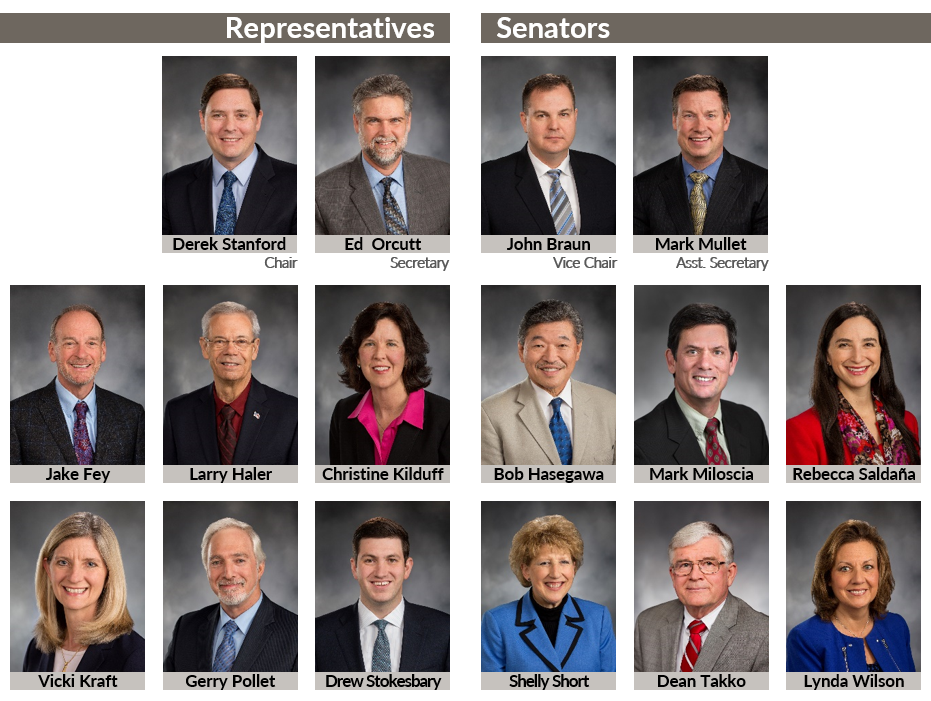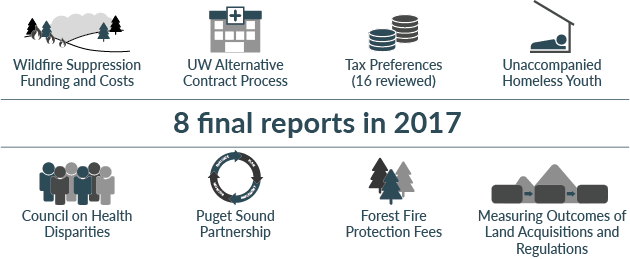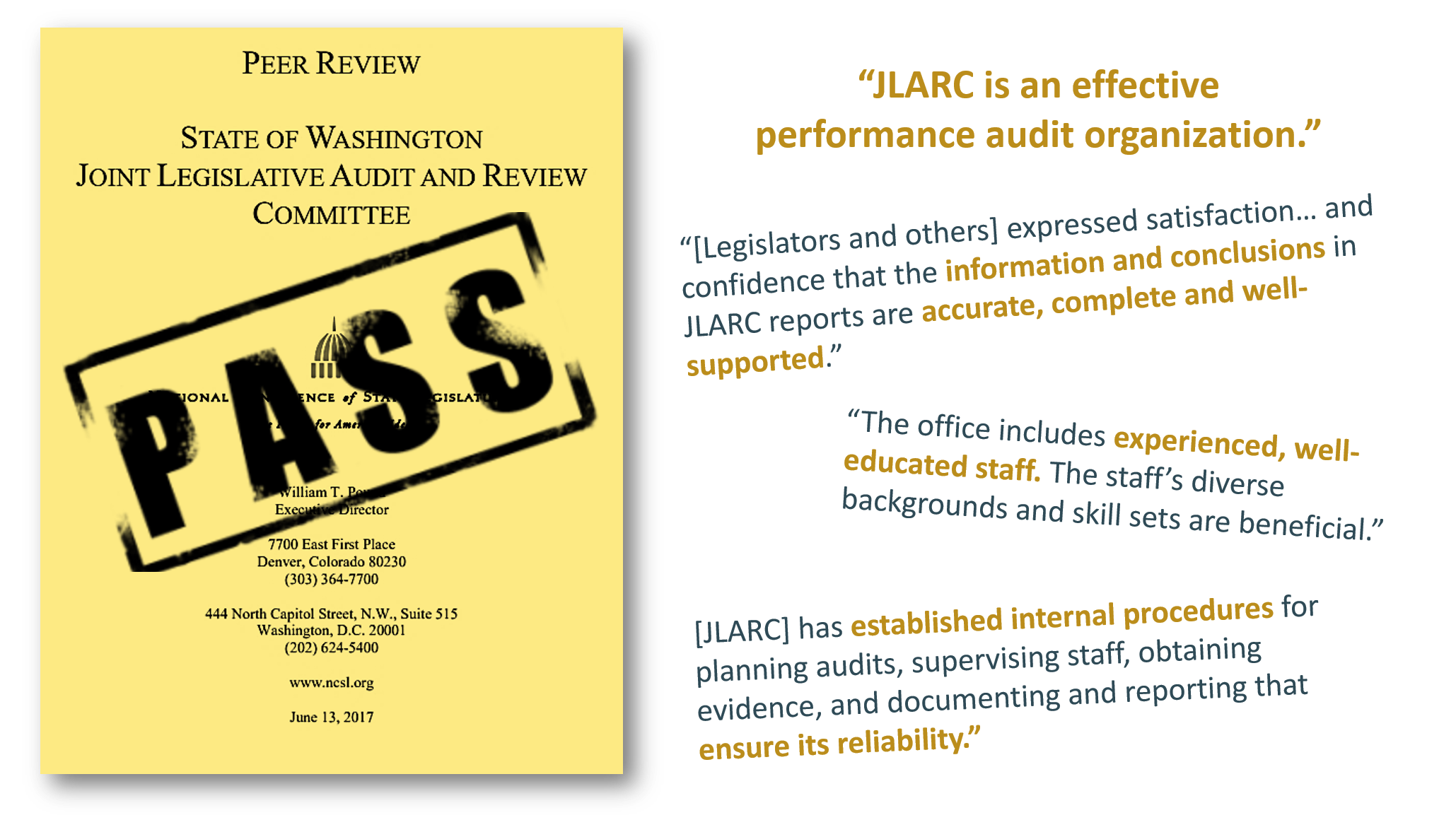JLARC staff complete performance audits and studies on behalf of the Legislature.
Our assignments often come through legislative provisos in the budgets and policy
bills. You can find the work plan for
the current biennium on our web site. Here are a few highlights.
Aerospace Technology Innovation Sunset
JLARC is to complete a formal sunset review of the joint center for aerospace
technology innovation.
Questions? Contact Zack Freeman or Amanda Eadrick
Cost Effectiveness of Housing Approaches for Low Income Households
JLARC is to evaluate and compare the cost efficiency of market rate housing in
Washington versus publicly subsidized housing projects intended to assist low-income
households. This review will attempt to standardize total costs for both approaches,
including land acquisition, pre-construction, construction and rehabilitation,
financing, administration, maintenance, and operations.
Questions? Contact Amanda
Eadrick
Employment and Community Access Services for People with Developmental
Disabilities
JLARC is to evaluate the employment and community access services that the
Department of Social and Health Services provides to people with developmental
disabilities.
Questions? Contact Ryan McCord or Melanie Stidham
Evaluation of the Effectiveness of the Local Infrastructure Financing Tool
The local infrastructure financing tool (LIFT) program was created to help local
governments promote economic development. JLARC must evaluate the effectiveness of
the program.
Questions? Contact Melanie
Stidham
Lodging Tax Expenditures Reported by Municipalities: Annual Non-Audit Report
Municipalities must annually report their use of lodging tax revenues to JLARC,
which makes this information available publicly through an on-line reporting system.
The most
recent lodging tax information reported by municipalities is on our web
site.
Questions? Contact Suzanna
Pratt
Higher Education Tuition and Other Programs
The Legislature has modified the policy for setting tuition over the last few
biennia. In addition, the Opportunity Scholarship and Opportunity Expansion programs
were created to mitigate the impact of tuition increases, increase the number of
certain baccalaureate degrees, and invest in programs and students to meet labor
market demands. JLARC is to evaluate the impacts of tuition policy and these
scholarship and expansion programs.
Questions? Contact Casey
Radostitz
Office of Youth Homelessness Performance Based Contracting
JLARC is to evaluate the adequacy and effectiveness of the Department of Commerce’s
Office of Youth Homelessness performance based contracting with homelessness service
providers, including compliance with performance measurement and reporting.
Questions? Contact Suzanna
Pratt
Public Records Data Reporting: Annual Non-Audit Report
Certain state agencies, municipalities, and other public entities will annually
report data about the characteristics of public records requests and the costs and
timeliness of responding to them. Data could be submitted by over 2,000 governmental
entities. Click here
for the most recent information about this project.
Questions? Contact Valerie
Whitener
Public Records: AG Consultation / Archivist Training and Grants
The Attorney General must establish a consultation program to help local
governments with best practices for managing public records. The State Archivist
must establish a competitive grant program to improve local technology public
records management and provide records retention training. JLARC must these
programs.
Questions? Contact Rebecca
Connolly
2018 Tax Preference Performance Reviews
JLARC staff review the preferences included in the schedule developed by the
Citizen Commission for Performance Measurement of Tax Preferences. Our 2018 preference review will include topics such as farming, multi-unit urban
housing, air ambulances, and corporate headquarters.
Questions? Contact Eric Thomas
Underground Storage Tank Program Sunset
JLARC will conduct a sunset review of the Department of Ecology’s (Ecology)
regulatory program for underground storage tanks. Ecology operates the program under
a delegation of authority from the federal Environmental Protection Agency in order
to implement requirements of the federal Underground Storage Act of 2005. The
program is intended to reduce leaky underground storage tanks and ensure that ground
water protection measures include secondary containment and monitoring.
Questions? Contact Suzanna
Pratt





 Our
audits offer recommendations to improve agencies’ performance or respond directly to
questions posed by the Legislature. Between 2013 and 2016, JLARC issued 19
recommendations to state agencies to improve the efficiency, effectiveness, and
accountability of their operations.
Our
audits offer recommendations to improve agencies’ performance or respond directly to
questions posed by the Legislature. Between 2013 and 2016, JLARC issued 19
recommendations to state agencies to improve the efficiency, effectiveness, and
accountability of their operations. 

 JLARC staff are often asked to present our work to legislative committees and
other interested groups. In 2017, we presented information about our tax preference
performance reviews, the study of unaccompanied homeless youth, and recommendations
to update and improve annual surveys and reports for tax purposes.
JLARC staff are often asked to present our work to legislative committees and
other interested groups. In 2017, we presented information about our tax preference
performance reviews, the study of unaccompanied homeless youth, and recommendations
to update and improve annual surveys and reports for tax purposes.